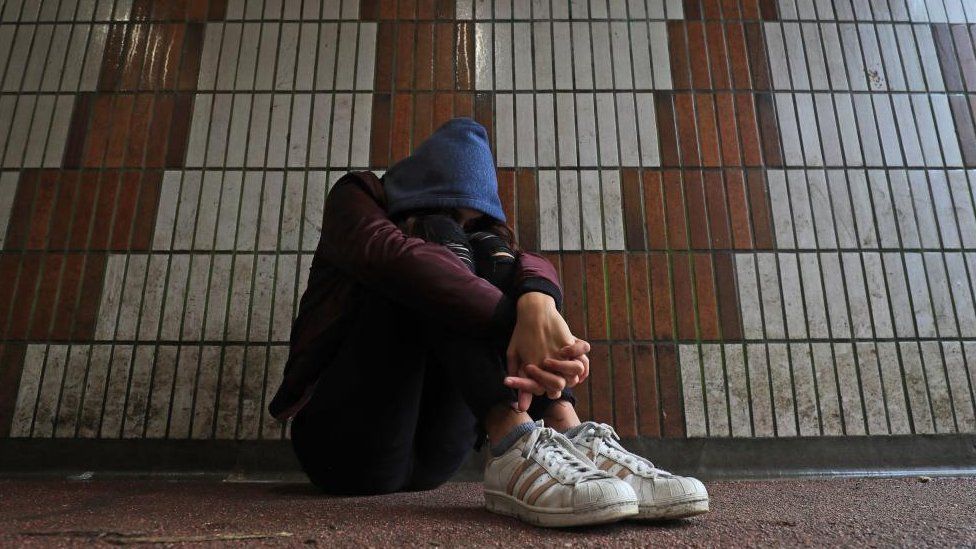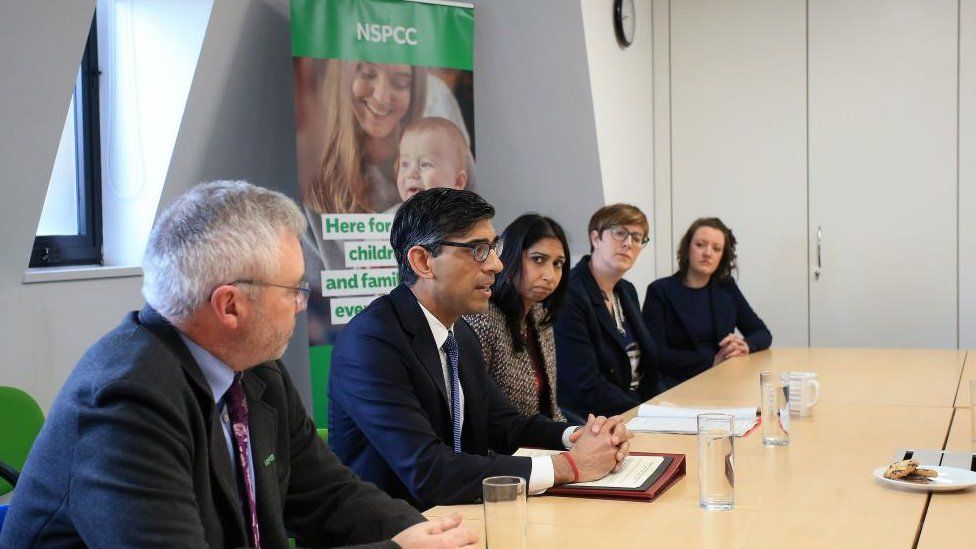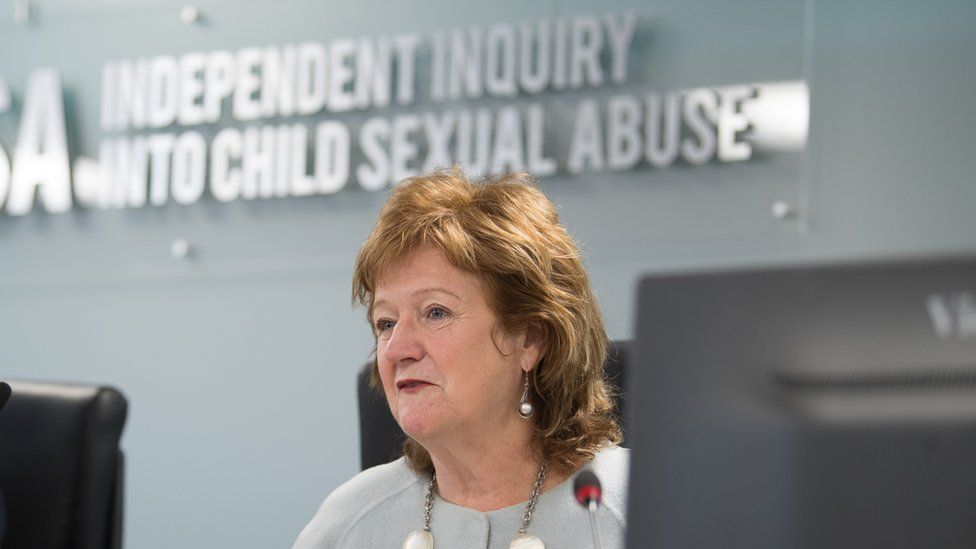Rishi Sunak criticises political correctness over grooming gangs

Victims of grooming gangs have been ignored because of political correctness, Rishi Sunak said as he set out plans for a police taskforce.
Specialist officers supported by the National Crime Agency will be sent to help forces with their investigations, the government said.
And better ethnicity data will help ensure abusers do not evade justice due to “cultural sensitivities”, it added.
Labour said the proposals were “far too inadequate”.
Under the new plans, more data on the make-up of grooming gangs, including ethnicity, would help ensure suspects “cannot hide behind cultural sensitivities as a way to evade justice”, the government said.
On a visit to Rochdale the prime minister was asked if the focus by the home secretary on British-Asian men when discussing grooming gangs in parts of northern England was appropriate.
Mr Sunak said it wasn’t right that cases of victims and whistleblowers had been “often ignored” by social workers, local politicians and the police in areas such as Rochdale, Rotherham and Telford – because of “cultural sensitivity and political correctness”.
Earlier Sabah Kaiser, ethnic minority ambassador to the Independent Inquiry into Child Sexual Abuse (IICSA), said it was “very, very dangerous” to turn child sexual abuse “into a matter of colour”.
She told BBC Radio 4’s Today Programme: “Child sexual abuse does not have a skin colour, it doesn’t have a religion, it doesn’t have a culture. Child sexual abuse does not discriminate.”
Professor Alexis Jay OBE, who chairs the IICSA and investigated child abuse in Rotherham, welcomed the announcement but indicated she wanted the government to adopt the 20 recommendations she set out last year in full “to better protect children from sexual abuse in the future”.
The taskforce announcement did not include any mention of new funding, or give any indication of how many officers would be involved.
Labour leader Sir Keir Starmer told LBC political correctness should not “get in the way” of prosecuting grooming gangs but added the “vast majority of sexual abuse cases” do not involve ethnic minorities.
Last year a report by the IICSA inquiry found the police and councils still did not understand the risk of organised gangs grooming children in their areas and were not collecting data which would help identify paedophiles and their ethnic background.
- Police and councils failing on grooming – report
It found that, in some cases, authorities might be potentially downplaying the scale of abuse, and that local authorities “don’t want to be labelled another Rochdale or Rotherham” – referring to the high-profile grooming gangs cases.
Signs of abuse were found in six areas studied by the inquiry, but police forces generally could not provide evidence about the extent of the problem.
The IICSA has previously called for better data collection across the country, and the Home Office acknowledged in 2020 that a “paucity of data… limits what can be known about the characteristics of offenders, victims and offending behaviour”.
Over years of hearings and research, IICSA also found child abuse existed in a wide range of contexts, ranging from religious institutions, schools, the care system, and online, which are not covered by Monday’s announcement.
There is also a huge backlog in cases going through the courts, which particularly affects victims of child abuse who sometimes have to wait years, while dealing with the trauma their experience has created.
NSPCC chief executive Sir Peter Wanless said the announcement “must be backed up with funding for services to help child victims recover and support for a justice system that is struggling to cope”.
He added that “predators… are from a range of cultural backgrounds” and warned it was “really important that by raising an issue such as race we don’t create other blind spots”.

Other plans announced on Monday include making membership of a grooming gang an aggravating factor during sentencing, Downing Street said.
The government has already said it will introduce a legal requirement for people who work with children to report abuse, or face prosecution.
Mr Sunak met with local police and victims in Leeds and Greater Manchester on Monday to launch the taskforce.
On Sunday Home Secretary Suella Braverman told the BBC there was “a wilful turning of the blind eye” among authorities, and that “cultural sensitivities” and concerns about “being called bigoted” had played a role in high-profile abuse scandals.
She said “vulnerable white girls living in troubled circumstances have been abused, drugged, raped, and exploited” by networks of gangs of rapists, which she claimed were “overwhelmingly” made up of British-Pakistani males.
An independent inquiry found at least 1,400 children had been subjected to sexual abuse in Rotherham between 1997 and 2013, with the perpetrators predominantly men of Pakistani heritage.
The racial profile of these cases resulted in the issue becoming a cause-celebre within far-right politics.
- Not reporting child abuse must be crime – inquiry
Home Office-commissioned research in 2020 found “a number” of high-profile cases had “mainly involved men of Pakistani ethnicity”, but also highlighted “significant limitations to what can be said about links between ethnicity and this form of offending”.
It said there was limited research on offender identity and poor quality data, which made it difficult to draw conclusions, however “it is likely that no one community or culture is uniquely predisposed to offending”.
Dr Ella Cockbain, associate professor at University College London’s Department of Security and Crime Science, told BBC Radio 4’s Today programme the government was “disregarding and contradicting” its own research to “push discredited stereotypes”.
Tracy Brabin, Labour Mayor of West Yorkshire, called Ms Braverman’s comments a “dog whistle”, while shadow home secretary Yvette Cooper said the plans were “far too inadequate for the scale of the problem”.
Alistair Carmichael, the Liberal Democrats’ home affairs spokesperson, said they supported steps to crack down on abusers, but said: “Unless the government tackles the backlog in our courts and restores community policing, too many criminals will continue to evade justice.”
Related Topics
- Child abuse
- Independent Inquiry into Child Sex Abuse
-
Not reporting child abuse must be crime – inquiry
-
20 October 2022

-
Published at Mon, 03 Apr 2023 16:56:41 +0000
